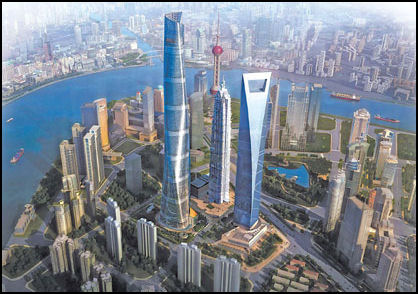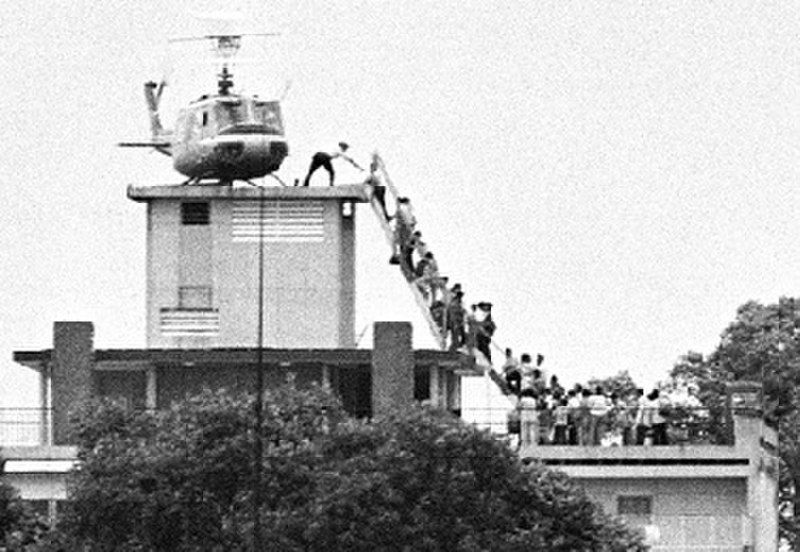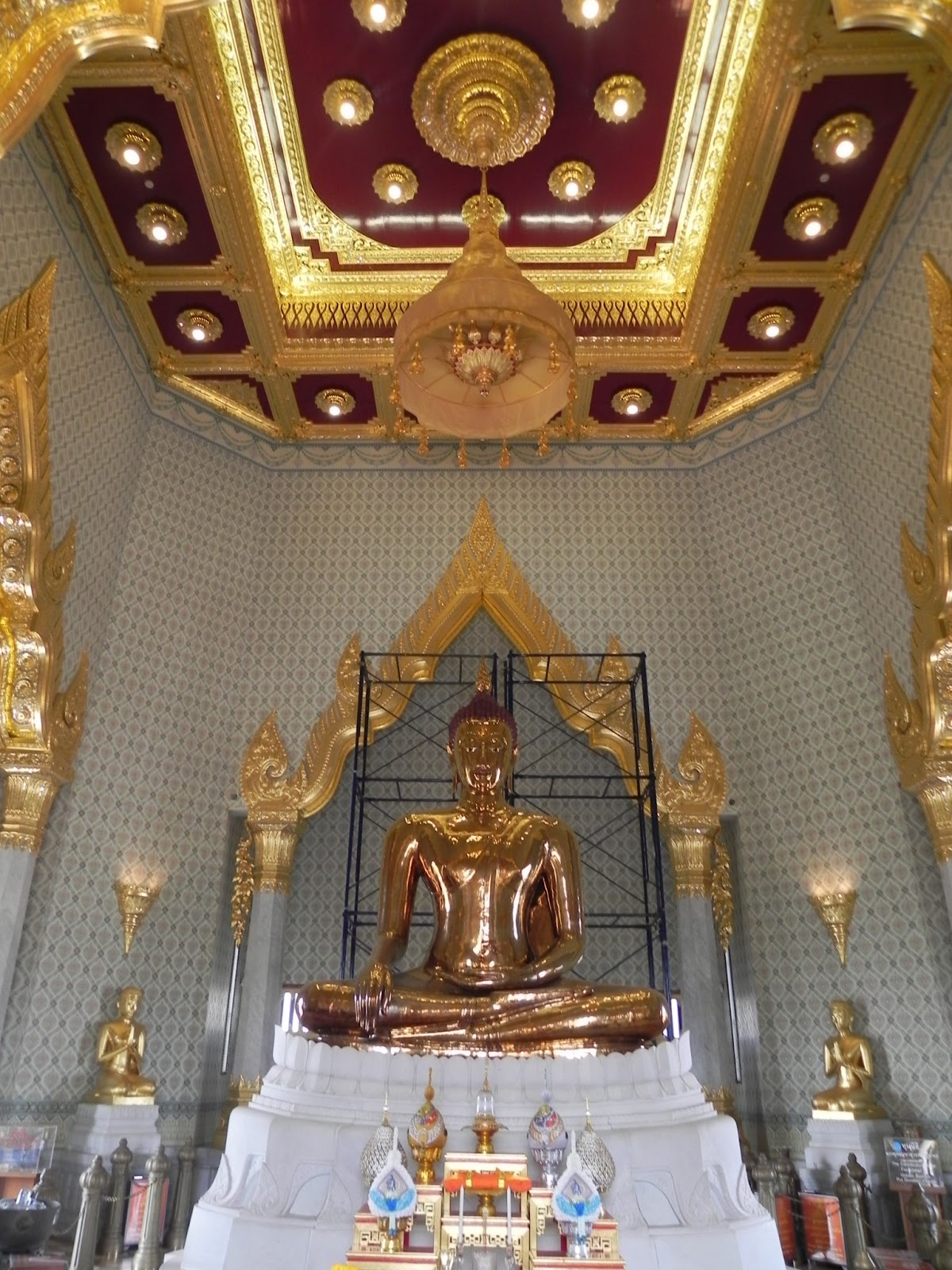Briefly, the usual routine when first meeting our local guides is for the guide to ask where are you from, where have you traveled to or where are you traveling to next. Often their response, once you tell them where you have been or where you are going to, is "that is wonderful and you will like..." but not "the situation between our two countries is a little tense at this moment." However, traveling in Asia at this point in time is interesting in a geopolitical sense.
But let us also not forget about the American political speak of late. Of course the US government is completely innocent of contributing to any of the geopolitical situations mentioned here, right.
Speak softly but deny
Our adventure in Japan included visiting historical or cultural sites and all of the Japanese guides with one exception were well educated females. In typical Japanese fashion their initial comment about our continued travels to China were "The Japanese don't travel to China now that there is a disagreements over the disputed territories." Benign and to the point without being rude. Very typical of how a Japanese person would say something that could ignite controversy. Not that the political leaders of Japan haven't used similar benign words to describe Japanese war time activities like "comfort women" being a military necessity.
But the Japanese rhetoric was a sharp contrast to what our Shanghai guide had to say.
Just be blunt
Our trip to Shanghai was a follow-up trip to our 2002 trip. Back in 2002 our desire was to see what life was like along the Yangtze River before the completion of the Three Gorges Dam project and to see some of the major cities in China like Beijing and Shanghai. We enjoyed our first visit but we were quite dismayed with the changes to China eleven years later. Shanghai had gone from a city starting to modernize to a full blown metropolis filled with modern high office buildings to row upon row of multi-story apartment buildings. Of course being in Shanghai during Chinese New Year may not have been the best to visit Shanghai.
Our Shanghai guide is a native Shanghainese and vocally expressed her opinions regarding the Japanese in China. Some of her anti-Japanese comments were based on a personal experience but nonetheless made me feel rather uncomfortable. She felt the Japanese had no right to the disputed island and went to say how Shanghai was being impacted by Japan and Japanese businesses located in China. And the best example was the World Financial Center in Pudong.
Here is a photo of the Pudong area of Shanghai.

The building that looks like a bottle opener is the Shanghai World Financial Center (next to Jin Mao Tower) and is the world’s second highest building. Officially unveiled in August 2008, around the time of the Beijing Olympics, the 101-story structure is 492 meters high and cost $1.1 billion.
Designed by New York architect Kohn Peterson Fox and conceived and owned by Japanese developer Minoru Mori, the Shanghai World Financial Center has a bold, sharp-edged design has been called a Chinese samurai sword. While the building was under construction a huge circle near the top was replaced with a rectangle to avoid any comparisons with the rising sun.

Sure seems like a lot of people getting their panties in a bunch but then.....
.... what about the new People's Daily newspaper building? Does it look like something else. Well maybe....
http://www.huffingtonpost.com/2013/05/02/china-peoples-daily-penis-newspaper-building_n_3197840.html

The sex jokes are not exactly deep, but government censors do not want any anatomy wisecracks. Period. China's state media already has a tight grip on what the country's people watch, see and read.
Results for "People's Daily building" on micro blogging website Sina Weibo have already been blocked. Instead, browsers get the following message, "In accordance with relevant laws, regulations and policies, search results cannot be displayed."
Read more: http://www.nydailynews.com/news/world/chinese-newspaper-headquarters-stuns-article-1.1339284#ixzz2Spn7t3VW
Our beloved Father and the French Connection
Yes, images of Ho Chi Minh are everywhere and Saigon is now referred to as Ho Chi Minh City but many still use the old French colonial name Saigon especially when referring to District 1, the city's main financial and commercial center.
| Statue of Ho Chi Minh reading to a child in front of the Communist Party of Vietnam headquarters in Ho Chi Minh City (formerly Saigon). |
So what about the Vietnam War and how do they feel about Americans visiting?
Most of us probably remember this iconic image from the end of the Vietnam War:
 |
| Evacuation of CIA station personnel by Air America on April 29, 1975. |
 |
| The building is still there but now surrounded by modern multi-story buildings. |
One of the most famous must see sights is the War Remnants museum and its presentation of the Vietnam War. Yes, it is a very one-sided presentation but when war and the atrocities associated with it are present by the country that suffered through the war one should expect it to be rather one-sided. But the feeling and the general mood in Vietnam is one of progress. Our local Vietnam guide said "we forgive but do not forget". And so they have move forward both economically and politically. All westerners are welcomed to visit Vietnam as it is one of the best revenue streams the country has outside of rice exports. This does not mean that all is forgiven and the Communist Party in Vietnam interacts with all Vietnamese citizens equally.
The remainder of our stay in Vietnam (Mekong River cruise) our river guide tried to explain about the economic progress of Vietnam since the end of the Vietnam War. Agriculture is the largest sector of the Vietnamese economy but the farmers do not own the land they farm. Đổi Mới (Renovation) is the name given to the economic reforms initiated in Vietnam with the goal of creating a "socialist-oriented market economy". Not really certain what this means but during our 2002 visit to China something similar was said to us but the phrase used then "China is now more pink than red." This line of thinking has allowed Vietnam much economic success and good trade relationships with most of the Western world. But there are still some restrictions as to who gets to hold a government job and many times it depends on what religion is practiced. As long as the religion is not Catholic then a government position is possible. Interesting as Catholicism is the second most practiced religion in Vietnam but then this distrust goes back a few centuries. Guess it is another way to separate the Church from the State.
So far I have mentioned that our trip included visiting two communist governments (China and Vietnam) and a constitutional monarchy government (Japan). So what about the other two countries that also have constitutional monarchies - Cambodia and Thailand?
 |
| Royal Palace in Phnom Penh |
Our arrival in Cambodia was shortly after the funeral services for Norodom Sihanouk or as referred to by the many locals as "The King-Father of Cambodia". Sihanouk has held so many positions since 1941 that the Guinness Book of World Records identifies him as the politician who has served the world's greatest variety of political offices. These included two terms as king, two as sovereign prince, one as president, two as prime minister, as well as numerous positions as leader of various governments-in-exile. He served as puppet head of state for the Khmer Rouge government in 1975–1976.
Pictures of the late monarch were everywhere and many citizens were still openly depressed that he had passed away. Here is a leader that seemed to be able to leave town just as the organic matter was about to hit the rotating blades but was being mourned as the greatest leader of all time. Really?!?
As I mentioned in my post "Khmer of Cambodia" the Cambodian people have suffered greatly throughout their long history of invasions by the neighboring counties but they all still seem to remember the "good days" when they were part of the French protectorate and not the horror of the Killing Fields. Sihanouk was a man of many talents and he frequently shared his passions with the other citizens of Cambodia, like performing songs in Khmer, French, and English as well as motion pictures. This did make him more like the common citizen thus well loved.
Now while on the subject of a ruler being well loved by a country's citizen let's move on to Bhumibol Adulyadej also known as Rama IX the current reigning King of Thailand. Having reigned since 9 June 1946, he is the world's longest-serving current head of state and the longest-reigning monarch in Thai history. Yes, very impressive but....
...the King is legally considered "inviolable", and lèse majesté offence against the dignity of the monarch may be punished by imprisonment.
So what is Lèse majesté, i.e. the crime of violating majesty. This law has been prohibited by the Law of Thailand since 1908. In 1932, when Thailand's monarchy ceased to be absolute and a constitution was adopted, it too included language prohibiting lese-majesty. The 2007 Constitution of Thailand, and all seventeen versions since 1932, contain the clause, "The King shall be enthroned in a position of revered worship and shall not be violated. No person shall expose the King to any sort of accusation or action." Thai Criminal Code elaborates in Article 112: "Whoever defames, insults or threatens the King, Queen, the Heir-apparent or the Regent, shall be punished with imprisonment of three to fifteen years."
This may not seem like a bad idea, however, what is missing is a definition of what actions constitute "defamation" or "insult". From 1990 to 2005, the Thai court system only saw four or five lèse majesté cases a year. From January 2006 to May 2011, however, more than 400 cases came to trial, an estimated 1,500 percent increase.
The 1956 movie "The King and I" is still banned in Thailand as are all of the versions produced since. Other banned writings include Blogs (I am not planning another trip to Thailand) or web links to books or articles deemed critical of the monarch.
 |
| Golden Buddha in Bangkok with Queen's emblem as part of the offerings. |
...the King is legally considered "inviolable", and lèse majesté offence against the dignity of the monarch may be punished by imprisonment.
So what is Lèse majesté, i.e. the crime of violating majesty. This law has been prohibited by the Law of Thailand since 1908. In 1932, when Thailand's monarchy ceased to be absolute and a constitution was adopted, it too included language prohibiting lese-majesty. The 2007 Constitution of Thailand, and all seventeen versions since 1932, contain the clause, "The King shall be enthroned in a position of revered worship and shall not be violated. No person shall expose the King to any sort of accusation or action." Thai Criminal Code elaborates in Article 112: "Whoever defames, insults or threatens the King, Queen, the Heir-apparent or the Regent, shall be punished with imprisonment of three to fifteen years."
This may not seem like a bad idea, however, what is missing is a definition of what actions constitute "defamation" or "insult". From 1990 to 2005, the Thai court system only saw four or five lèse majesté cases a year. From January 2006 to May 2011, however, more than 400 cases came to trial, an estimated 1,500 percent increase.
The 1956 movie "The King and I" is still banned in Thailand as are all of the versions produced since. Other banned writings include Blogs (I am not planning another trip to Thailand) or web links to books or articles deemed critical of the monarch.
- May 2011. Joe Gordon, an American citizen born in Thailand as Lerpong Wichaikhammat, had lived in the United States for thirty years before returning to his homeland where he was arrested on charges of insulting Thailand's monarchy — in part by posting a link on his blog to a banned book about the ailing king. Gordon is also reportedly suspected of translating, from English into Thai, portions of The King Never Smiles – an unauthorized biography of King Bhumibol Adulyadej – and posting them online, along with articles he wrote that allegedly defame the royal family.On 8 December 2011 a court in Thailand sentenced Joe Gordon to two and a half years in prison (halved from five years due to pleading guilty) for defaming the country's royal family by translating excerpts of a locally banned biography of the king and posting them online. The 10 October AP report on Joe Gordon's plea adds that "Yingluck’s government has been just as aggressive in pursuing the cases as its predecessors.". On July 10, 2012, Gordon received a pardon from the King and was released from jail.
- March 2012. Akachai Hongkangwan was arrested for selling VCDs containing a segment of the Australian Broadcasting Corporation Foreign Correspondent series. Australian foreign correspondent Eric Campbell and ABC’s entire Bangkok bureau had been banned from entering Thailand after they aired an investigation of Bhumibol's role in the military's violent 2010 crackdown on protesters. The report was broadcast only in Australia.
- January 2013. Somyot Prueksakasemsuk was sentenced to 10 years in prison, convicted of publishing two articles under a pseudonym that made negative references to the crown in his now-defunct anti-establishment magazine, Voice of Taksin, which was launched in 2009 to compile political news and anti-establishment articles from writers and contributors.
It must be good to be the King ;-) I certainly hope that as Americans we have the sensibility not to enact such restrictive laws but I am afraid we have already lost that battle as our freedom is being monitored by our government through the use of electronic spying and UAVs.
No comments:
Post a Comment